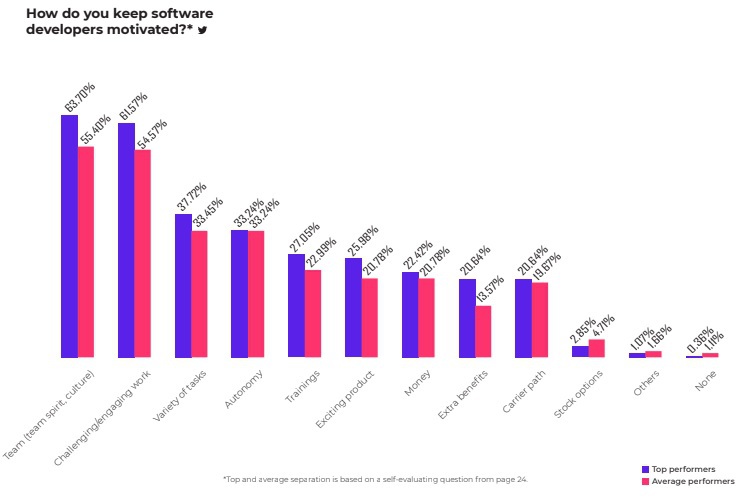
One of my friends told me, “There is no such time when you are not looking for a job,” and boy, was he right. LaSalle surveyed more than 4000 technologists to learn what motivates developers and what they’re looking for in a new job.
Turns out, 76 percent of the surveyed technologists are always open to new opportunities, so even if you just hired the best IT professionals, consider that they already have one foot out the door. Developer motivation is crucial.
Here are five things to focus on to retain developers.
1. STRONGER BENEFITS PACKAGE
Top respondents stated the better the benefits package, the more motivated developers are to retain their current workplaces. To evaluate your benefits, you need to seek feedback from your employees. Find out what is important to them, and whether their current package is still as valuable to them as it once was.
Tech talents tend to value flexibility and autonomy, so consider instituting a work-from-home policy if you haven’t done it already, or allow employees to work condensed hours during the week to give them work-life balance.
This brings us to the next point, which is…

2. WORK-LIFE BALANCE (TA-DA!)
This is key to keeping developer motivation high.
The respondents who stated they were not open to new opportunities said the work-life balance was the number one cause that keeps them from leaving their current companies.
Flexibility programs are gaining more happiness at work and preventing burnout. Creative and passionate professionals won’t do their best work if they are often second-guessed. Give your engineers some freedom, when it comes to approaching the problems, and measure them on their results rather than how they achieved them.
Google once did (and then reportedly stopped) giving developers a certain amount of time off each week to pursue pet projects. Give them opportunities to unplug and recharge. Help them with benefits to make time for themselves so ultimately they will be more engaged at work.
Let them feel they can take as much time off as they need, so long as they accomplish their goals. Also, if you are constantly faced with capacity issues, why not outsource?
You’re not alone in facing this challenge. According to the State of Software Development 2019 Survey, 24.32% of engineering managers said capacity issues are their biggest challenge.

3. COACH DEVELOPERS
As development is quite a technical job, it requires very precise knowledge of the company’s structure, goals, rules and policies.
Either there are new technologies coming in or just a know-how about the existing ones. Make sure you provide the necessary environment for learning and experimenting with new technologies.
Developers tend to like challenges, but they also like to know what they are getting into. You should encourage their professional development and acknowledge their concerns so they will stay on board.
Tech companies are always looking for an experienced senior. Why not coach developers you already have to become the seniors you need? If you create a revolving system, it could cause junior developers to constantly be advancing through the ranks. Alongside a mentorship system, give them regular feedback, and don’t be afraid of investing time and energy into their career development.
The better you coach developers, the more likely you retain developers. A sustainable ecosystem can truly cultivate the next generation of leaders!
This is exactly what we do at Coding Sans. We hire interns right from the university and spend a lot of time coaching developers and teaching them the latest technologies. As they learn more and get more experience, they advance to a junior position, and years later, they become senior. We also found that developers hired this way are more likely to stick with us in the long-term.
4. DEVELOPER CAREER PATH
After training your junior developers to become seniors one day, be prepared. Since they are always keen for challenges, they will climb that ladder.
Hence, you need to make sure your employees will find open doors to go to when questions arise about their future in your company.
You should provide emotional and professional support as well. Lay out a clear developer career path for them. Have regular meetings with them and ask them to come up with a personal development plan with goals and real actions they want to take to reach their professional goals. Not everyone wants to be an engineering manager, so the best way to handle it is to provide two main career paths: one that leads to engineering management and another to craftsmanship (engineering with a lot of technical knowledge).
When it comes to high-potential employees, they need to visualize their career elevation to feel appreciated. Everyone is thinking about how to achieve their personal and professional goals, so you need to find a way to set up a rewarding and motivational relationship between your employees and their managers, in order to encourage them, honor their efforts, and make them confident. A monthly or bi-monthly 30-minute meeting with every team member could clear up any possible doubts.
👉 Training Engineering Managers: This Is The Way to Keep Growing

5. CREATE A CULTURE OF LEARNING
According to the State of Software Development report, when evaluating aspects of company culture, learning, growth and development ranked as the most important factors to technologists.
Continuous learning is highly important to learn adaptive skills in the rapidly changing landscape of technology.
Providing your developers cross-trainings could be a plus as they get to learn from experts from different areas, especially when an employee is more interested in a lateral path of learning new skills, rather than becoming a manager.
Encourage them to take part in hackathons, meetups, and conferences, or better yet, host your own events! You could even sign them up to experiences like the RareSkills web3 developer bootcamp to broaden their horizons and support their professional growth so that the whole team can benefit.
Knowledge-sharing within your engineering team is important. In this post, we highlighted four effective ways to transfer knowledge, which will improve developer motivation.
We did an awesome event combining agile training and team building, called Lean Poker. Check it out!
SUMMARY
Hiring and especially recruiting the right developers is a lot of work, but retaining and motivating developers requires even more work.
When it comes to keeping existing professionals at your company, you have to be ready for challenges and failures. That does not necessarily mean you have to let them go for good, but a place for improvement and a clear developer career path are certainly proven to make your workplace more attractive to talent.
These points above do not only apply for software companies; every employer should listen to their employees individually to propel the organization’s success. Nothing will work miracles, but if you consider our tips above, you should be on the right track to improving developer motivation and retaining your talented developers.
Want to read more? Here is a case study on how a tech company proactively retains developers.
FURTHER READING 📗📘📙:
👉 Engineering Team Management: A Proactive Approach to Retain Developers










